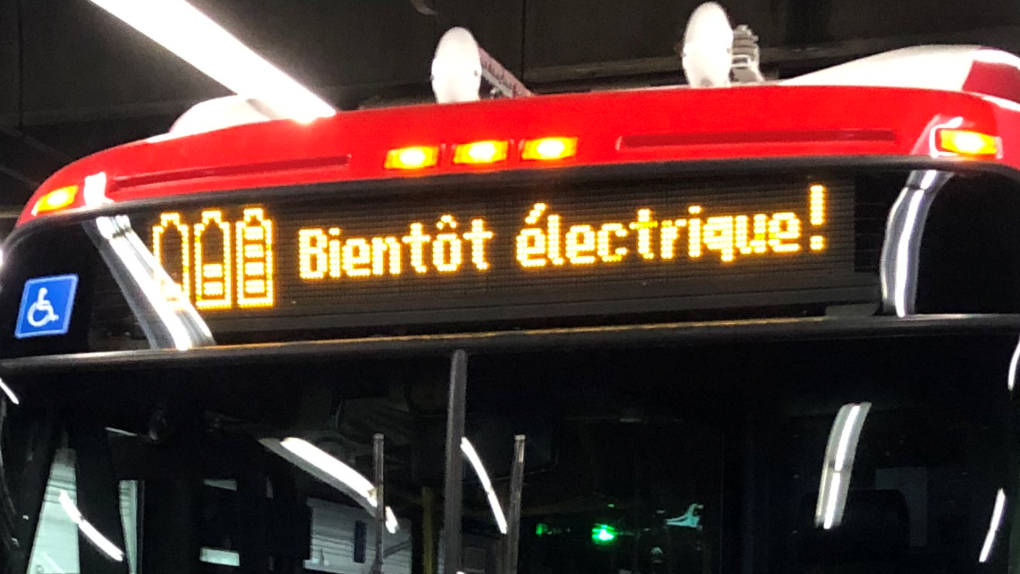Electric buses can serve as diesel bus substitute in Ottawa, report concludes
 An electric OC Transpo bus is seen in this 2021 image. (CTV News Ottawa)
An electric OC Transpo bus is seen in this 2021 image. (CTV News Ottawa)
Electric buses have received the green light to operate on Ottawa's roads.
A report for the Transit Commission says the Zero Emission Bus pilot program shows the battery-electric buses "met or surpassed" the range and efficiency promised by the manufacturer, and saved OC Transpo more than 100,000 litres of fuel.
OC Transpo purchased four New Flyer XE40 electric buses as part of the pilot project, with buses placed in revenue service in February 2022. The testing for the buses included regular routes longer than 10 hours and driving distances over 200 kilometres.
"The zero emission bus pilot project has shown that Battery Electric Buses can operate in service, as an alternative to diesel buses," staff concluded.
Staff used the pilot project to study key performance indicators of the buses to ensure they were fit for Ottawa's climate, including mileage, efficiency, diesel savings, maintenance and operation costs, and the availability of the buses and charging infrastructure.
"The original block range limit was set at 200 km as our testing began in winter months. The E-Bus easily handled that range," the report says, adding OC Tranpo set a monthly target of 18,500 km for the total E-Bus fleet to match operational requirements.
"In the spring and summer, the range limit was set to 250 km. Again, the E-Bus had no issues handling that range."
The report, to be discussed at Thursday's Transit Commission meeting, says staff will continue to monitor how passenger load affects efficiency with the buses. Different passenger loads can increase demand on the traction motor, the biggest consumer of energy on the E-Bus, by up to 15 per cent.
Mother Nature can also play a role in limiting the efficiency of the electric buses on Ottawa's roads, with cold temperatures requiring electric heating.
"If the temperature in the passenger cabin drops below the HVAC setpoint, the electric heater comes on to provide additional heating," staff said. "Temperature conditions can reduce the efficiency of the E-Bus by as much as 24 per cent, but the E-Buses still meet minimum distance requirements."
Poor road conditions will automatically disable the regenerative braking on the buses, requiring traditional braking to occur. Staff say that can reduce overall efficiency by up to 10 per cent.
OC Transpo tested the electric buses during the record-breaking snowstorm on Jan. 17, 2022, when 47 cm of snow fell on the capital. The routes that the test was performed on had limited plowing and no road salt or sand.
"We performed stop-starts on all the identified hills and bus stops and the E-Bus never got stuck," the report says.
In January, council voted to spend nearly $1 billion to convert OC Transpo's entire fleet to electric buses. The city will purchase 26 40-foot buses this year, with another 77 electric buses purchased next year and the goal to convert the entire fleet to electric buses by 2036.
CTVNews.ca Top Stories

Calgary woman stranded in Mexico after husband's death during diving trip
A Calgary woman is struggling to return home after her husband died while diving in Mexico, leaving her stranded and facing financial hardship.
Fugitive U.S. rioter seeks asylum in Whistler amid warnings of more to come
An American citizen convicted of participating in the Jan. 6, 2021, riot on Capitol Hill and dodging jail time in Whistler may just be the start of an asylum-seeking rush, according to a prominent legal expert.
Special national Liberal caucus meeting called for next week after regional chairs meet: sources
A special meeting of Prime Minister Justin Trudeau's national Liberal caucus has been called for next Wednesday, sources say.
N.S. community shocked by deaths of father, daughter; suspect was wanted in Toronto shooting
A Nova Scotia community is mourning the loss of two of its members after they were shot and killed in Halifax on New Year's Eve.
Canada pausing applications for parent, grandparent permanent residency sponsorships
Canada will not accept new parent and grandparent permanent residency sponsorship applications until further notice, according to a ministerial directive.
Soldier who blew up Tesla at Trump hotel left note saying blast was to be a 'wakeup call' for the U.S.
A highly decorated Army soldier who fatally shot himself in a Tesla Cybertruck just before it blew up outside the Trump hotel in Las Vegas left notes saying the New Year's Day explosion was a stunt to serve as a “wakeup call” for the country’s ills, investigators said Friday.
Sea and Himalayan salts recalled in Canada: 'Do not use, serve or distribute'
Two brands of sea and Himalayan salt are being recalled in Canada due to pieces of plastic found in the products.
'Inadmissible' foreign nationals to pay more upon return to Canada: CBSA
Foreign nationals who refuse or are unable to pay their own way home after being denied stay in Canada will soon face steeper financial penalties should they ever attempt to return.
'It's about time': Experts in Canada support call for warnings about cancer risk from alcohol
While Canada hasn't mandated cancer warnings for alcoholic beverages, a few experts are supporting a new push in the U.S. to have the labels on the products.

































